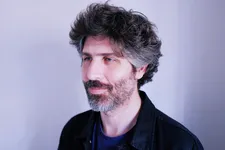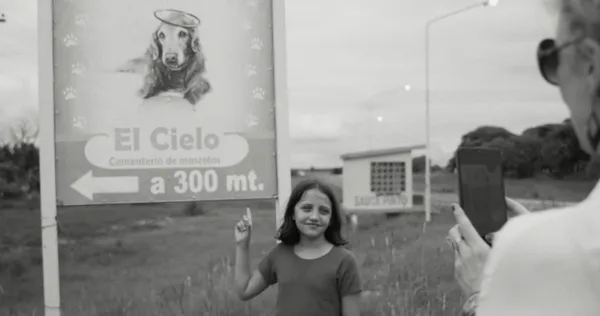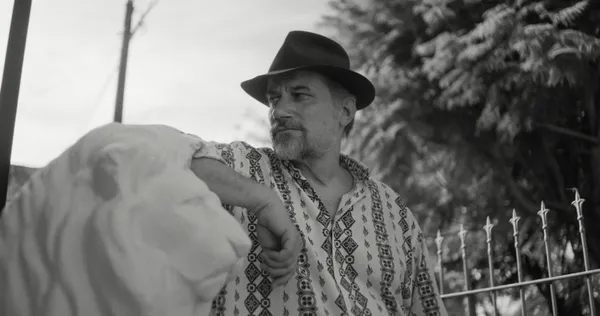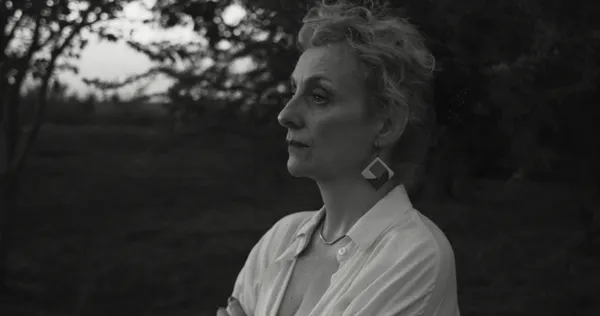 |
| Iván Fund: 'I believe that fiction is not just simply the contrary of reality, but that it is a tool to pry open that reality and render it more visible' Photo: Betania Cappato |
Iván Fund's The Message (El Mensaje) invites us to take a camino on some of the less travelled roads of Argentina with a young girl and her two older guardians, as she forms a psychic connection with pets - living or dead - for their owners in return for cash. The loose black and white drama, stars young newcomer Anika Bootz alongside veterans Marcelo Subbioto and Mara Bestelli, as well as a host of four-legged and furry non-professionals. The film had its world premiere at Berlin Film Festival, where we caught up with Fund to talk about the origins of the story along with his own intuitive form of filmmaking.
How did the idea come to you to make this film?
Iván Fund: What I was particularly interested in was this world of childhood. This is the moment that all children share that they can somehow communicate with animals, that they can have a connection to the world of all living beings in a way. I believe very strongly that the world of childhood and the world of cinema are absolutely intrinsically linked as well, and that there are the same elements of wonder, surprise, attention and sensitivity towards the world that later on in life, as we move on, tend to get lost. I was attracted to this particular moment and a mixture of gazes, in that sense, on the one hand that childhood gaze is full of magic and which is kind of indeterminate as well, which Anika has, but also with one step already beyond, not just looking and believing but also wanting to shape it in a way, and that is something that I'm particularly interested in as a filmmaker.
I believe that fiction is not just simply the contrary of reality, but that it is a tool to pry open that reality and render it more visible in all its various facets and shapes and move away from a very simplistic worldview.
It's an interestingly ambiguous film because there'a a question hanging over the family as to whether they are scammers or not.
IF: There are two things that need to be highlighted here. When I work in building up a character in a film, I want to work on their expression and for that to be as good as possible but at the same time, I do not want to limit them or clip their wings. It’s what I said about what I believe that fiction does in sort of prying open reality and allowing so many multiple facets to come to the fore. I’ve always tried to avoid judging the characters. It's a bit like the people who surround us anyway in everyday life - very often, you have to guess what their motivation really is and what lies behind their actions.
I believe that there has to be a right to maintain that kind of mystique in a way and a presumption of innocence, which I gladly apply to my characters in this film. But on the other hand, it's absolutely true there is this element of scamming of being sort of opportunists, perhaps, taking advantage, to a certain degree, of people's gullibility.
 |
| Aniki Bootz in The Message. Iván Fund: 'I believe very strongly that the world of childhood and the world of cinema are absolutely intrinsically linked' |
But above and beyond that, there is also something that is unquestionable and that's the nobility of the feelings that they have also towards each other, this bond of warmth and love that runs through the family and that characterises them. We’re invited to travel with them. My filmmaking is like layering and setting up as an offer to the audience to go through this experience.
I think it's also very strongly linked to the character of Anika because one of the things that really defines childhood, in my opinion, is that children discover at some moment that the adults are not able to perform acts of magic.There's a comic strip that’s very known in Argentina, Mafalda, by Quino, and there's this moment where the children realise that Santa Claus isn’t really Santa Claus, it’s her father dressing up. She’s really sad, not because it’s her father but because her father doesn’t have any money, so it’s a double disillusion, if you will.
Are these kinds of pet mediums present in Argentina or did you take the idea from another place?
IF: It wasn’t inspired by any concrete example. But we found out during our research that there were quite a lot of people out there engaged in this kind of business and there's a huge market, particularly driven by social media. You have the whole spectrum. For example, horse whisperers but then at the other end of the spectrum, you have people who connect with the reincarnation of the pet as an alien in a separate Galaxy. So it’s wide open and reality is even weirder than science fiction. And perhaps science fiction is our new reality.
How did you choose Anika Bootz for the role?
IF: She's my stepdaughter. Her mother and I have been together for the past eight years so she was kind of involved from the very beginning of the project because it took us many years actually to realise this project. At the beginning she was still a very young child and she was very sad because she realised that I was writing this film and she had said, “Well I want to be the actress in this film” - but obviously she didn't fit the age bracket.
But fortunately enough given all the difficulties that exist to find the funding for the film, etc. the years went by and lo and behold, she hit the age bracket so she could take up this role. There’s also this other link with Marcelo Subiotto and Mara Bestelli, who play the grandparents in the film, they are actually a couple in real life too and there's a very strong friendship and bond of tenderness that exists between them that I also wanted to put into the film.
Tell us a bit about your process of working with actors, because I noticed that in the press notes, you said that the Pet Shop Boys’ music was kind of accidental when Anikia put it on and you just kind of grabbed the camera and you shot. To what extent do you like to capture those everyday things rather than maybe sticking precisely to the script?
IF: We worked with a small team, between cast and crew were just ten people and everybody was very much attuned and very much focused on the possibility of taking a flexible approach to the process. That’s why this process as a whole was so intense for everyone involved.
That much of a difference really between those who are in front of the camera and those who are behind the camera. In fact, we worked very often without “cut” or “action” so we were always attuned to what chance and happenstance could throw up as an element. Something that could nourish or be channelled into the narrative. Reality offers these impromptu flowers that, if you keep an open mind about it and your eyes open, you’re able to harvest and use.
I was very much focused also on the kind of tone and the texture also of it. There are these archetypes that lead to a form of acting which is really informed by the kind of spontaneity and the fresh gaze that the everyday experience provides. That's what we really wanted to capture in this film. So, the way I work was really that we shot during the day and then I would edit, during the night and in the morning we would have a look at the footage and have a conversation about it and then decide about the next steps.
In some cases, for example, a scene that had been a planned or didn't make any sense any more because we had already taken a different element into another scene, so it was a very organic process that involved everyone and anything could change at any time and that change was to be embraced and to be seen as something positive. That was our starting point.
 |
| Marcelo Subiotto in The Message. Iván Fund: 'We worked very often without “cut” or “action” so we were always attuned to what chance and happenstance could throw up as an element' |
Very often there is this paradigmatic view of cinema that everything has to move according to a plan and a strict timeline. I often compare that to what happens on the football field. It would be absurd to say, well, in the 15th minute of the second half a goal is going to be scored. That's not how it happens. I believe also that it's important in my work to define the guardrails and then to allow for things to pan out and let the narrative emerge from it.
This movie fits perfectly into a new wave of Argentinian cinema that includes Trenque Lauquen, movies that explore a rural theme or magic realism because of the political situation in Argentina. Where do you think this trend is going to go? Are Argentinian stories going to change?
IF:Yes, think that Argentinian film and filmmakers have always found a way to make their films. I think that if there's anything that characterises cinema and film in Argentina it is the kind of obstinate against all odds way of continuing to find forms and ways to make films. It was always a struggle to make films but now the situation is worse than ever.
But now I also believe that some ways of filmmaking and storytelling that always existed on the fringes of the mainstream are now coming more to the fore and are becoming even more vital to maintain filmmaking until conditions improve. But I would guard against seeing it only in terms of lack of funding.
I think that basically my film and I think many this holds true for many of my fellow filmmakers in Argentina is that films come about because filmmakers and directors want to make these films because there's a clear will to make these films and there’s a clear necessity also. As has always been said Utopia comes in small portions. Because other than that, you immediately fall into this kind of industrial perspective. I think that is the danger as well. Because if you start looking at it only from the point of view of policies, funding and and infrastructure and the money that goes into it, you only actually perceive it from an industrial set of arguments and industrial commercialised gaze of filmmaking.
I believe there has to be an approach that is an open door to a world of marvel and a world where you have a right to poetry and you have a right to link to stories in a different way. I don’t know whether resisting is the right word but I think there are many directors who are responding to a certain urgency and a requirement to make films in different ways so as to continue to uphold culture and, within culture, also the culture of cinema.






















